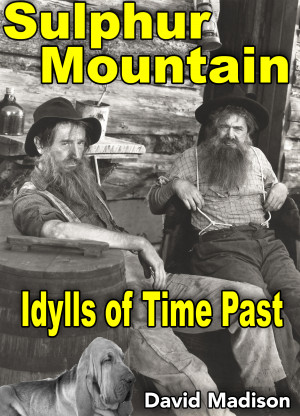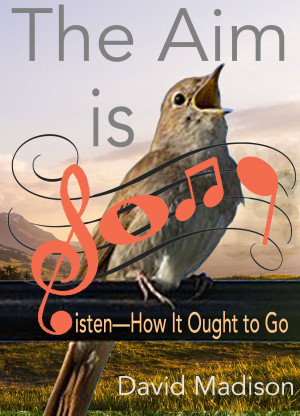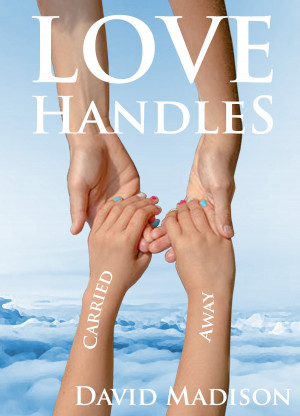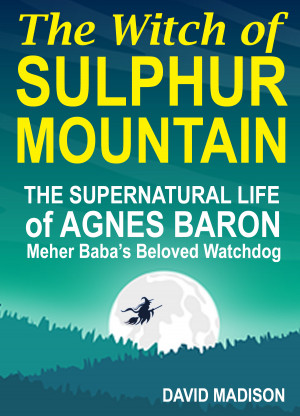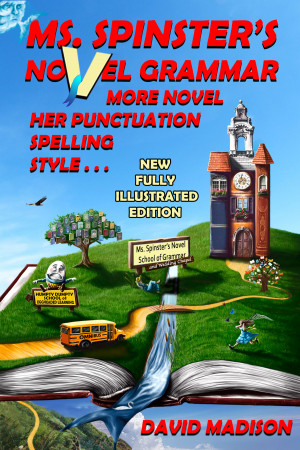Interview with David Madison
Published 2019-02-25.
How did Ms. Spinster come about?
.
Why don't you make yourself comfortable? Bear with me while I rummage back a number of years. . . . Okay, here it is: It was a typically rough, overcast day, and Ms. Spinster, in the gloom of life, was all at sea in her two-masted fore-and-aft-rigged "Ketch" with its mizzenmast stepped aft of its taller mainmast, but forward of the rudder. As usual, she was plying the perpetually cold and lonely Straits of Spinsterhood, on her same old tack, beating hard north into a headwind on a broad reach for the safety, shelter, and dreamy love that awaited her in the mythic harbor of Matrimony. Hope sprang eternal in her breast. Today, at long last, she would discover, and sail blissfully into it. Suddenly, as if she’d conjured it, off the port bow, her heart leapt into her throat on catching a fleeting glimpse above the waves of the fabled harbor's narrow entrance. There was no mistaking it, suffused as it was by the most heavenly roseate glow. In less than a heartbeat she thrust the tiller hard to starboard, ducking quickly as the boom of the mizzenmast flew over her head in the opposite direction, the sails filled, and she rapidly came about—on a joyously different tack. Yet, at the same time, longing more than ever to tie the connubial knot, she found herself on the same old tack. Woebetide! She missed the harbor's entrance by a knottical mile, brought up on a shoal with no hope of ever floating free, and once more rapidly came about—to tears. The ill-christened Ketch failed her of the one she had been dreaming of her life long.
That's the short story, though I guess some would argue it's something of a stretch. The longer one—why don't you kick back and put your feet up?—is this: Ms. Spinster came about as a joke, or rather a joke came about as Ms. Spinster:
To gaze upon her now in all her grammatical novelty, you might think she sprang to life fully fleshed. Not even close. Just as you and I began as a twinkle in our father’s and mother’s eyes, so Ms. Spinster began in mine, as a play on words based on a rule of grammar, which I worked up into this little chestnut:
A convict, upon being released, said ever so politely to his jailer, “Now, officer, if you’ll just be so kind as to open this gate, I’ll walk out of here a free and wiser man—and I promise you you’ll never see the likes of me here again! What do you say, officer?” he said jocularly, elated about his imminent freedom. “Would you be so gracious as to accept my proposition?”
No sooner did he utter these fateful words than a shrill alarm sounded, guards pounced on him, he was beaten senseless, and thrown headlong into solitary confinement—for life! In his joy the hapless reformed man had unwittingly forgotten the strict penal institution’s No. 1 rule: Never end a sentence with a proposition.
Well, that’s a tasty enough morsel for the Borscht Belt, I thought with some complacency; but being a lifelong versifier, I plowed it under, and up came:
Rule No. 1 2 Not End Sentence With
Time served, a convict, getting out of stir,
Elatedly effused, “Good officer,
If you’ll now kindly open up this gate,
I’ll air-walk out of here in joyful state,
A free and wiser man—and you’ve my word
I’ll never more be seen in here or heard!
What say you, kindly turnkey, would you be,
In opening this gate, releasing me,
So gracious—oh, the rapture! readmission:
LIFE!—as to accept my proposition?”
No sooner did he sound these fateful words
Than shrill alarm screamed (undiminished thirds),
Ten guards pounced on him, beat him sanguinary,
Threw him, bloody, into solitary
“Yes, the ‘hole’—for LIFE—con!” The reformed
Releasee, once more prison-uniformed,
Had, in his joyful, jocular locutions,
Forgotten the strict penal institution’s
No. 1 Rule: Never (“LIFE Punition!”)
End a sentence with a proposition.
It had a certain je ne say kwaw charm, as the Italians say, and I thought, If I can get 10 such verses based on a rule of grammar, it would make an amusing interlude in a book of verse. Well, I got 10 and thought, could I get 25? I did, but then I reasoned, it won’t answer merely to state the rule. I must go on to explain the rule and give examples in a continuation of the storyline in prose, making a concise one-page fable-like tale; a fabulous tale. When I had done that, it occurred to me that it would be that much more captivating if, instead of nameless, faceless persons, I were to have glamorous celebrities illustrate the rules in the course of their fascinating lives, each chosen to illuminate a particular rule for their unique star qualities. So singer Con E. Francis became the con above, and so on.
(to be continued)
How did Ms. Spinster come about? continued
.
That was all well and good, and I wondered, could I get another 25? When, after some protracted head scratching I did, I had the temerity to think: could I possibly get 101, which could be a book unto itself—with its own cover—on many a shelf? You might have guessed that, casting aside all doubts, I rose to the challenge, and in time was equal to it. I might have stopped there (a reasonable person would have), and basked in the warm glow of accomplishment. But ever a sucker for punishment, I couldn’t keep myself from masochistically thinking, what about the rules of punctuation, typography (italics, capitals, abbreviations, and numbers), and spelling? Could I possibly get another 101 of those, such as “Use bullets sparingly,” in like hair-loss manner. With the passage of time (wars were fought in less), I succeeded; and with scarcely a thought of taking refuge in complacency, I thought, what about the rules of style, such as “Avoid cliches like the plague?” Could I scrabble together a further 101? With a span of time I could have fit Noah’s Ark in, and still have room for a boatload of cerebration, I did. It was done! and so was I, or so I thought for as much as an instant. In for a penny, in for a pounding, I always say, and I found myself thinking, what about those so-called “rules” of thumb that aren’t really rules at all, and which thumb of us love to thumb our knowses at with impunity, such as “Never end a sentence with a preposition,” which breaks its own rule by ending with “a preposition”? Could I get a goodly number of those, which would be the most cherished of all? Conducting a further “raid upon the inarticulate,” I was cheerily victorious in thumbing my knows at 27 such counterfeit commandments, making in all 330 Novel Rules. Done! But no sooner did I entertain that merciful notion than I found myself thinking, I surely need some latter-day Aesop, or Mother Goose–like character to cobble all these fabulous tales together into a most novel form. So, after much auditioning, and many thumbs down, Ms. Spinster, the frustrated embodiment of a schoolmarm in gingham dress and high lace boots was born; and there was no denying that her grammar was novel. And I thought, “Well I’ll be! Damned if Ms. Spinster’s Novel Grammar isn’t a fait a compli! And, sure enough, I soon was: I straightway entertained that some few colorful illustrations would gussy the whole up nicely. But before I could jump in and save myself, it struck me that it would hardly be fair, or satisfying, and, more to the point, would be dangerous in the extreme, to give face to some celebrities, and not the others. At the same time, I realized, with sinking heart, that I couldn’t afford an illustrator, much less a dozen. There was nothing for it but that I must purchase Photoshop and learn how to use it. A year and a half later I could, in all truthfulness, and fairness in advertising, pronounce it “fully illustrated” with more than 350 novel photos, 836, laugh-and-learn pages. The most novel grammar you’ll ever READ.
That's how Ms. Spinster came about: about fourteen years from the twinkle of conception.
What do you hope to achieve through your writing?
.
Robert Frost’s aim (“the aim was song”) was to lodge a few poems where they would be hard to get rid of. E. B. White hoped to write a few things that had the odor of permanence. We all want something like that. It is hardwired into us to desire and to seek some measure of immortality in leaving something of ourselves behind. With most it is the compulsion to pass on their genes. No less driven, I, too, have sired children, and hope to sire many more. But they are not the flesh and blood, rather the Frost and White variety; such “works and days of hands” as I have brought to life, given name to, and nurtured, cared for, and wept over. I do not have the other children, nor, at my age, will I have. But if I did, how much immortality could I hope for? Each would have half my genes and half my better half’s. Their offspring would have one quarter, and theirs one eighth, and theirs one sixteenth, and theirs one thirty-second . . . one sixty-fourth . . . one one hundred-and twenty-eighth . . . one two-hundred-and-fifty-sixth . . . one five-hundred-and-twelfth . . . one one-thousand-and-twenty-fourth. Saints preserve me, in a few generations there would be as little of me as there is Indian blood in Elizabeth Warren, which is to say virtually nothing, though in her there is nothing of virtue.
Regarding my de facto love children, conceived in complete asexual solitude, only imagine the immortality that shall be mine! As soon I give birth to each that is pure, unadulterated me, owing to the advent of self-publishing, in one generation (the length of time it takes to hit “Publish”), thousands with the same driven purpose vainly swell the grossly distended body, every hour of every day, so diluting my ever diminishing immortality that I would give my I teeth, if only I might be one-millionth as full-blooded native charlatan as Elizabeth Warren, whose immortality, thanks to her unadulterated DNA test, is 100% assured.
If you could have money or critical acclaim from your writing, but not both, which would you choose?
.
It would depend on where I am financially. I live simply, and if I should have enough to be free of want of the basics, and in reasonable health, I would choose critical acclaim. I take my writing seriously enough to want to be taken seriously by others. I want to leave something behind of value other than financial wealth. There were good books in the world when I came into it, and I would like to leave some for those to come. I can have but a few short years until I am beyond all worldly considerations. On the other writing hand (I guess that’s an outmoded expression now, as everyone pecks away with both), if I were destitute and sick, it would be a different story. Same story, but different outcome. I could easily rationalize thus: If my writing made a lot of money, though some might consider it dreck, that would mean that a lot of people found value in it. And isn’t that the aim of writing: to produce something of value? And if it should be panned, and I was satisfied with it, why should I care what critics say? Opinions are like a-holes: everybody’s got one, and a hole lot more. Still, if I thought I had an Alice in Wonderland or an Elegy Written in a Country Churchyard in me, I could make Job seem a simpering pantywaist to get it out. In fact, I could suffer a lifetime for a minute of knowing, before dying, that I had done so. Allow me to sell you a couple.
Are you ever stymied by writer’s block?
.
No, and if I ever should be, I shall consider myself as having been suddenly and unaccountably mentally impoverished. I have an “Ideas” file, in which, as they occur to me, I jot down topics for writing, whether it be an idea for a poem, a joke, a title, a pun, political or cultural commentary, whatever. It has swelled to some pages. In fact, as I expounded upon at length above, “Ms. Spinster’s Novel Grammar” started as the little six-line joke about the convict ending his sentence with a proposition. It patiently reposed in the file for years, knowing one day it would have its way with me, and that I would do something about it in song. The awful truth, and I here confess it, is that I suffer from writer’s glut. I know that I can never come close to fleshing out all the ideas in it (so many ideas; so little time). It’s the writer’s equivalent of a kid in a candy store with a penny, and faced with an agony of decision. Even now, as I think of the term “writer’s block,” I think, what a great idea, and title, for a novel—comic, romantic, murder mystery, psychological study, or other. Can’t you just begin imagining, and peopling it. An actual city block, or an apartment building, say in Greenwich Village, Soho, Paris, inhabited, or rather infested by writers, not necessarily contemporary, but from throughout history. I recall a television show like that, in which celebrities imagine dinner parties consisting of an eclectic mix of luminaries from different ages. In fact, if you’re really blocked, as you seem to think you are, I hereby give you leave to steal the idea from me. Chances are I’ll never be able to get to it, and I can’t wait to see what you’ll do with it, and how you came up with the idea.
What is your next book?
.
“The Witch of Sulphur Mountain,” a book of poetry based on my decade (1999–2010) atop Sulphur Mountain in Ojai, California. The title is that of the central poem, a narrative verse about Agnes Baron, a devotee of Meher Baba (“Don’t worry, be happy”) who said he was the Avatar (God in human form), and who chose not to speak for the last 44 years of his life. It chronicles the life of Baron who, spiritually disillusioned, at first resists him (“I’ve had it with gurus”), but then gives herself to him wholly, and spends the last 58 years of her life acquiring, and, against all odds, hanging onto 170-acre Meher Mount (“Baba’s Place”), atop Sulphur Mountain, which he only ever sets foot upon once in 1956 for less than a day. Nor is there a shortage of other eccentric residents: next-door neighbor actor Larry Hagman (J. R. Ewing of “Dallas”; “I Dream of Jeannie”) who so fears the nearby Doppler Weather Station’s radar that he sits behind a lead shield in his 26,000 sq. ft. Mediterranean-style villa (“Villa on the Hilla”), and whose liver transplant, a result of drinking, soon fails him (lead poisoning?); and Ida Eyroud, the Wild French Shepherdess of Sulphur Mountain who “roams the wild countryside barefoot with weeds in her wild hair”; and the mountain itself with its nose-curdling sulphurous water (strongly suggestive of witchery), which nonetheless hangs out a sign, many signs, clearly discernible in its every nature:
Resident poet wanted.
References required.
Apply in rhyme.
If good, you're hired.
There is the long, probing interview (“Have you ever sung the praises of a mountain before? Are you willing to be on the job 7 days a week, work for plenty of room and board? Have you meters enough to do justice to my 900? For what in life would you say I am a perfect metaphor? If you were ever to use a simile, what would you say I am like? How are you at synecdoche and metonymy? You wouldn’t try personifying me, would you? Are you good with rhyme—perfect rhyme? You’re not a free verser, are you? You wouldn’t ever try reducing me to a haiku, would you? . . . )
The successful hiree is an organic-gardening, beekeeping, bodybuilding, celibate raw-food vegan who lives in a sufficiently poetic converted school bus, slowly drives a ’64 Dodge Dart (and those behind him crazy), and keeps two cats (Russian blue male, tortoiseshell female) on the rodent qui vive. I do not say that he is strictly autobiographical, but he is a curiosity:
“I’ve built away, away up there,
So many castles in the air
That no one longer stops to stare,
And gravity has ceased to care”
the way he mixes that in with other things like “dead possum on the road / waiting to explode in the hot sun / and get that business of rotting done”; a flock of nearly extinct California Condors that touch down close by, and eye him unnervingly (do they know something about him he doesn’t know?); two neighbors, one old, one young, who make a team for tree-felling so they can see, once more, at sunset, the blushing “pink moment” on Topa Topa’s stone face, and see Chief Peak and Princess Topa Topa pick up their feethills and go walking, land in land, in the moonlight. . . .
A decade full of characters, incidents, musings, imaginings, reflections.
What do you love about self-publishing?
.
Let me narrowly confine self-publishing to ebooks. How do I love them? Let me count the ways:
First, and it’s a love that knows no bounds, I am mercifully, gloriously set free—forever—from the insufferable arrogance of traditional (hidebound) publishing, and ALL that it so condescendingly entails: purchasing the latest 8 lb, 1800-page “Literary Marketplace” for a mere $395.00 plus $25.00 shipping, so that, from the 13,000 entries, I can be privy to the most up-to-date “no unsolicited manuscripts”; “no simultaneous submissions (you must submit to US only, and in the most grovelingly manner”); “agent-only submissions. In other words ($25.00 extra), you can’t get published because you don’t have an agent (provocateur), and you can’t get an agent because you haven’t been published.” And it’s worth every penny, too, if only I might read what is so clearly written between the lines: “you might more profitably practice jumping over the moon than clinging to what quixotic hope (the straw-clinging variety) you have in sending out—yes, by snail mail—your meticulously crafted, ill-fated cover letters, query letters, synopses, book proposals, manuscripts (double-spaced—on ONE side of the page only—so that a 500-page book becomes a 2,000-page, $100.00 Kinkos monstrosity), obsequiously addressed to the acquisitions editor of the moment (genetically incapable of thinking outside the box, much less inside the book). Furthermore, don’t make us sign for anything! By following these guidelines you may be assured that your heart and soul will go directly into the slush pile without passing glance for a requisite period of months, before being pulled out and given a contemptuous fleeting glimpse before being put into the shredder. If you want it returned, accompanied by the even more self-esteem-shredding rotten rejection letter, make sure you include a self-addressed, stamped cargo container.”
Yes, how, together with the further lure of a whopping 7.5–10% royalty, and a host of other indignities too painful to recount, could I not love being ecstatically, blissfully liberated from the arrogant tyranny of old-world print publishing?
As Smashwords so liberatingly states, “your ebook. your way.” Well my way is to have more than 350 large color photos in 836-page “Ms. Spinster’s Novel Grammar.” Try running that by one of the Big-5 publishing houses as a first book by an unknown author with zero platform. Ebooks are reflowable; change font, size, background color, page width (one page or two), line spacing, screen brightness. Hyperlinks instantly whisk you to any part of the book, even beyond. Ebooks weigh nothing, and take up virtually no space. You can have hundreds, even thousands on a small handheld device. Take them anywhere. They don’t collect dust. Proof? They don’t have dust jackets. You can highlight, make notes, copy passages, on DRM-free ebooks (which all Smashwords ebooks are). Even Kindle ebooks that are DRM protected can be copied. Just highlight a passage, go to your highlights page, and copy it there. Zoom in on photos. Ebooks automatically bookmark your place, and take you to it when opened. They’re searchable, and have a built-in dictionary. And a built-in light so you can read at night. They never go out of publication. And not least, you can feed your pie hole and read at the same time without having to hold the book open. And here’s the icing on the cake: they’re cheaper (sometimes free) than a limbo-dancing Scotsman trying to get into a pay toilet. What’s not to love about that?
Since you raised the question, what’s not to like about self-publishing?
.
It’s too easy to get published, and too many are. I’d say the barbarians are at the gate, if there was one. Not long ago there was. Now it’s open Borders. Correction: Borders is now closed, overrun by the caravans. So it's open Barnes & Noble, Amazon, iBooks, and too many others to mention. When the late Christopher Hitchens was asked what he thought about everyone having a book in him, he replied that, for most of them, that’s where it should stay. Safe to say that fell on deaf ears. The prevailing strategy now is to crank out as many titles as you can, and what you can’t, ghost writers on Fiverr and other such work-for-hire sites can. Others will do it for nothing. All you have to do is plagiarize them. Though such titles may be little more than pamphlets, slap alluringly deceptive covers on them, a low price, and flood the genre. And hustle, hustle, hustle. Times were when the cream rose to the top. Now, unless it’s promoted six ways to sundae, with chocolate sprinkles and a cherry on top, it just gets creamed, and, like MH370, rises to the bottom where no one is ever going to see it. It’s the new numbers racket, and it should be just as illegal, and not infrequently is. Times were when there used to be safety in numbers. Now numbers are not safe. Except it’s a safe bet that it’s only going to get worse, much worse. It used to be publish or perish. Now it’s publish, publish, publish and promote like hell or perish: Facebook, Instagram, Twitter, personal web sites, blogs. Give something away in return for signing up. Then chat them up, and pitch to them. They’re your market. And wouldn’t you know it? There's another Great Flood of books on how to go about implementing all these “best practices.” Allow me to sell you a couple.
How important to you is it that your writing be good writing?
.
None whatsoever. As Ms. Spinster rules, “There’s no good writing; only good rewriting.” That begins with the first word laid down, which, before anyone sees it, I quickly exchange, with a red face, for a better one. Not the right one, just a better one. Only when I’ve repeated that process over and over and over do I eventually arrive at the right word. Which anew gives rise to the age-old question: Why is it that when you’ve lost something, you always find it in the last place you look? Answer: because when you find it you stop looking. Only I never stop looking. On days when the words don’t come, I seek encouragement and the will to go on by taking in hand “The American Heritage Dictionary of the English Language,” which cumbrous title is only less weighty than the volume itself. Awestruck, I think, In my hand I hold the greatest, most beautiful, most moving story ever told. It’s all there. All I have to do is simply rearrange it. So buoyed, I sometimes even look inside, but that’s only when there’s a power outage, and I can’t effortlessly look into “The Free Dictionary” online, and have to supply the power myself. But more often than not I pore upon “Thesaurus.com.” And when, after great effort, I have scrabbled together sufficient right words that I flatter myself constitute writing, I bear in mind, getting a further tough mental workout, William Strunk’s three rules for effective writing: Eliminate unnecessary words. Eliminate unnecessary words (2 reps—come on, come on, one more!). Eliminate unnecessary words. Phew! So with that I will simply repeat, “There’s no good writing; only good rewriting.” You can just go ahead and eliminate everything in between the first iteration and the last yourself to arrive at it. I’m bushed.
What’s the worst writing advice you’ve ever heard?
.
Write what you know. That’s what all who know nothing are doing. No, write what you don’t know, but write it so masterfully, artfully, convincingly, beautifully that readers will say, “Now THERE’s a writer!” and immediately append, “who doesn’t know to avoid the adverb plague.”
Smashwords Interviews are created by the profiled author or publisher.
Books by This Author
Sulphur Mountain: Idylls of Time Past
by David Madison
Sulphur Mountain is real, a choice piece of real estate east of Ojai, CA. It also occupies a choice piece of real estate in my mind. Living atop the mountain from 1999–2010, I was powerless to keep its idiosyncratic denizens from squatting, resisting all efforts to evict them. At first I was put out; but coming to realize they were there for GOOD, I thought, FINE, I’ll write about them.
The Aim Is Song: Listen—How It Ought to Go
by David Madison
Taking aim at 39 subjects, I’ve endeavored to put them into song. But taking aim is no guarantee of bringing the quarry down. Many factors are in play, like hand shake. If you feel I’ve brought down a quarry or two, give my hand a shake—a short one—for still I have in sight some trophy beasts I dream of bringing down, and would be such a shame to miss. So please keep the handshakes short.
Love Handles: Carried Away
by David Madison
Every man is a poet when he is in love. —Plato
Love Handles is a collection of 53 love poems; 53 ways I was moved to handle love: sometimes with honeyed words, sometimes with honey-coated thorns. Yet however much I was carried away, I always took pains to handle each with tenderest care. If I hadn’t, could I really call it love?
Full disclosure: some are erotic. But I'm sure you can handle it.
The Witch of Sulphur Mountain: The Supernatural Life of Agnes Baron, Meher Baba's Beloved Watchdog
by David Madison
Price:
$3.99 USD.
Words: 57,180.
Language:
English.
Published: November 21, 2019
.
Categories:
Poetry »
Epic
"Baba, if you want Meher Mount I’ll keep it for you through hellfire and damnation!"
With these words fiery witch Agnes Baron commences the remaining 46 years of her hard life devoted to Indian mystic Meher Baba who claims he's the Avatar (God in human form). She will get plenty of both.
A narrative idyll in heroic verse, heroic aptly describes her 87-year odyssey, 46-year trial by fire.
Ms. Spinster's Novel Grammar: More Novel Her Punctuation, Spelling, Style . . .
by David Madison
330 Novel Rules of grammar, punctuation, spelling, style—each one truly fabulous (in the manner of a fable), “a short narrative making an edifying or cautionary point, often employing as characters animals that speak and act like humans.”
500 celebrities glamorously bringing the rules to light and to life.
350 mirth-inducing photoshops, as colorfully novel as the celebrities they make light of.

